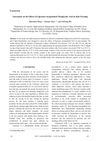
Afro-textured hair is more fragile and prone to certain scalp conditions, requiring careful treatment and more research for effective management.
 1 citations,
December 2021 in “International journal of research in dermatology”
1 citations,
December 2021 in “International journal of research in dermatology” Dermatologists should learn more about shampoos to better treat hair and scalp issues.
 December 2024 in “Biomedical & Pharmacology Journal”
December 2024 in “Biomedical & Pharmacology Journal” Hair Tonic A, with white tea extract, is better for improving hair health.
 March 2005 in “International Journal of Cosmetic Science”
March 2005 in “International Journal of Cosmetic Science” DVI provides detailed 3D imaging of hair and shows how various products protect and enhance hair.
 August 2023 in “International journal of research in medical sciences”
August 2023 in “International journal of research in medical sciences” The serum is safe and helps treat premature greying of hair.
 January 2014 in “Sen i Gakkaishi”
January 2014 in “Sen i Gakkaishi” Liposome-encapsulated thioglycolic acid improves hair perming effectiveness and durability.
 47 citations,
April 2016 in “Lasers in Surgery and Medicine”
47 citations,
April 2016 in “Lasers in Surgery and Medicine” Low-level laser therapy may improve hair regrowth and thickness for androgenetic alopecia, but more research is needed.
 418 citations,
September 2012 in “Nature”
418 citations,
September 2012 in “Nature” African spiny mice can regenerate skin, hair, and cartilage, but not muscle, and their unique abilities could be useful for regenerative medicine.
 16 citations,
April 2012 in “Journal of mammalogy”
16 citations,
April 2012 in “Journal of mammalogy” Young female Australian fur seals are losing hair due to low tyrosine and zinc levels and high pollution exposure.
 8 citations,
January 2020 in “Skin Pharmacology and Physiology”
8 citations,
January 2020 in “Skin Pharmacology and Physiology” Caffeine improves hair growth, thickness, and reduces shedding.
 1 citations,
April 2024 in “International Research Journal of Modernization in Engineering Technology and Science”
1 citations,
April 2024 in “International Research Journal of Modernization in Engineering Technology and Science” Herbal shampoo cleans hair well and is safer than regular shampoos.
 November 2022 in “Nihon Nyuusankin Gakkaishi/Nihon Nyūsankin Gakkaishi”
November 2022 in “Nihon Nyuusankin Gakkaishi/Nihon Nyūsankin Gakkaishi” The lotion with N793 strain significantly increased hair density and reduced hair loss safely.
 53 citations,
April 2021 in “Cell Host & Microbe”
53 citations,
April 2021 in “Cell Host & Microbe” Skin bacteria, specifically Staphylococcus aureus, help in wound healing and hair growth by using IL-1β signaling. Using antibiotics on skin wounds can slow down this natural healing process.
 41 citations,
December 2017 in “Lasers in Medical Science”
41 citations,
December 2017 in “Lasers in Medical Science” Low-Level Laser Therapy (LLLT) is a safe and effective treatment for common hair loss, but more research is needed to find the best power and wavelength for treatment.
 March 2024 in “Clinical, cosmetic and investigational dermatology”
March 2024 in “Clinical, cosmetic and investigational dermatology” Skin Radiance Collagen improved skin and hair health in adult females.
15 citations,
August 2020 in “Analytical chemistry” Hair lipids do not protect against humidity.
 1 citations,
December 2022 in “̒Ulūm-i dārūyī”
1 citations,
December 2022 in “̒Ulūm-i dārūyī” The new wound dressing with minoxidil and dexamethasone could speed up healing and reduce scarring in rats.
October 2023 in “Biomimetics” The new hair-dyeing shampoo is safe, colors hair evenly, and strengthens it.
March 2025 in “Journal of Cutaneous and Aesthetic Surgery” The cytokine and peptide serum was most effective in reducing hair loss and improving hair growth.
 22 citations,
February 2013 in “Wound Repair and Regeneration”
22 citations,
February 2013 in “Wound Repair and Regeneration” Mice genetically modified to produce more CD109 in their skin had less inflammation and better healing with less scarring.
3 citations,
September 2016 in “Clinical, cosmetic and investigational dermatology” Sphinganine can reduce hair loss and improve scalp health.
 January 2023 in “Journal of Cosmetics, Dermatological Sciences and Applications”
January 2023 in “Journal of Cosmetics, Dermatological Sciences and Applications” The hair growth serum Trichosera® was effective in increasing hair regrowth and density and reducing hair fall without significant side effects.

The serum effectively promotes hair growth and reduces gray hair without side effects.
 December 2023 in “Journal of Cosmetic Dermatology”
December 2023 in “Journal of Cosmetic Dermatology” The hair growth product was effective and safe, increasing hair growth, thickness, and density while reducing hair fall.
February 2025 in “Biomimetics” The shampoo straightens hair while keeping it healthy and less damaged.
December 2021 in “Cosmetics” November 2023 in “Cosmetics” Rice derivatives in conditioners protect and improve hair health.
 November 2024 in “Journal of Cosmetic Dermatology”
November 2024 in “Journal of Cosmetic Dermatology” PRP improves hair transplant results in androgenetic alopecia patients.
 July 2024 in “Periodontology 2000”
July 2024 in “Periodontology 2000” Autologous platelet concentrates show promise in esthetic treatments but need more standardized research.
 35 citations,
October 2017 in “Signal Transduction and Targeted Therapy”
35 citations,
October 2017 in “Signal Transduction and Targeted Therapy” Fibromodulin treatment helps reduce scarring and improves wound healing by making it more like fetal healing.























